Updated: February 3, 2023
by Psychic Source
Predicting the New Year: What Does 2023 Have in Store?
The start of a new year is always exciting. January bubbles with the thrill of the unknown, hope for the future, and resolve to be better. As we ring in 2023, what awaits us in the new year? To find out, we surveyed 1,000 Americans about their New Year’s traditions, predictions, and hopes for the coming year.
Key Takeaways
- Over 80% of Americans participate in a New Year’s superstition.
- Searches for “psychic reading cards” are up 1,285% in 2023.
- 85% of Americans believe in psychic phenomena.
- Millennials are most likely to have psychic abilities, according to psychic assessment test results.
- Self-proclaimed psychics scored 22% higher than those who didn’t claim to possess some sort of psychic abilities.
A Hopeful 2023
The new year has officially begun, and many of us see new possibilities ahead. As the past year fades away, what hopes do Americans have for the next 12 months? What traditions do they engage in to turn their wishes into reality?


Our survey indicates that Americans are anxious to discover what the new year may bring. Over the past year, Google searches for “psychic reading cards” have gone up 1,285%, while searches for “horoscope psychic readings” rose 400%. We also found that many Americans perform New Year’s superstitions to help manifest their hopes and dreams for the future.
A Hopeful 2023
What New Year's Superstitions did you participate in?

33%
Started a new calendar

32%
Wrote wishes, hopes, & dreams

28%
Shared a midnight kiss

28%
Kept extra cash in wallet

25%
Ate collard greens & black-eyed peas

24%
Opened doors at midnight

23%
Made some noise

28%
Filled kitchen cabinets

23%
Carried an empty suitcase

28%
Ate 12 grapes at minight
What is your number one New Year's Prediction for 2023?

In addition to peeking into the future, over 80% of Americans participated in a New Year’s tradition or superstition to make their 2023 wishes come true. Starting a new calendar was the most popular tradition (33%), closely followed by writing down one’s wishes, hopes, and dreams (32%). But many engaged in more unique superstitions. To increase luck in the new year, 25% of respondents ate collard greens and black-eyed peas, 24% opened their doors at midnight, 20% carried around an empty suitcase, and 19% ate 12 grapes at midnight.
As for what they wished for, almost a quarter of Americans wished for good health, another 20% wanted a new house, and 16% hoped for financial prosperity. Given the recent pandemic, competitive housing market, and economic recession, it’s no wonder these wishes were at the top of so many lists. Surprisingly, only 11% of people wished for love and just 9% for happiness. Perhaps many believe that good health, a nice home, and financial security will bring love and happiness without the need for extra wishes.
An Optimistic Future
The past few years have not been easy. But as the days press on, a new year brings fresh hope. With 2023 underway, Americans want to start the year with more clarity and security. From getting psychic readings to turning the page on a new calendar to eating grapes, traditions and superstitions are being put to the test. If we’re lucky, they’ll work; our wishes will come true, our resolutions will be kept, and this year will be better than all the ones before.
Seeing Beyond the Senses
We use the five senses of touch, taste, hearing, smell, and sight to interact with the world and make sense of what’s around us. But what about a sixth sense – extrasensory perception (ESP), otherwise known as psychic abilities? How many of us can see the future, sense what’s to come, communicate with the beyond, or know what someone else is thinking?
To find out, we surveyed over 1,000 Americans about their belief in psychic phenomena and whether they believed themselves to have psychic abilities. We then tested the participants using the Zener Test and compared their self-perceived abilities with their actual psychic abilities. Keep reading to explore the relationship between self-perception and genuine psychic abilities.
Intangible Perceptions
The mind is a powerful thing; how you perceive yourself can affect what you’re able to achieve. If you believe yourself to possess such powers, does that make it true? Let’s find out.
Psychic Ability Perceptions
Self Assessment
 Have you ever consulted a psychic or medium?
Have you ever consulted a psychic or medium? 
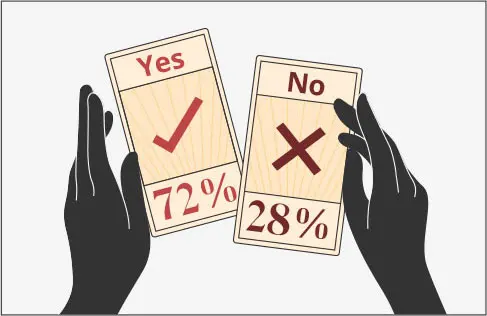
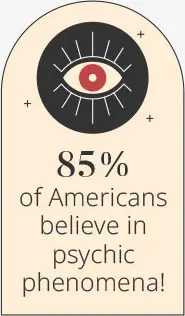

We know that many Americans believe in the supernatural. Among our respondents, 85% said they believe in psychic phenomena in particular. In fact, 72% reported having consulted a psychic or medium (someone who can communicate with souls on the other side) at least once. But we were surprised by how many claimed to have psychic abilities.
 Which of the following psychic abilities do you possess?
Which of the following psychic abilities do you possess? 
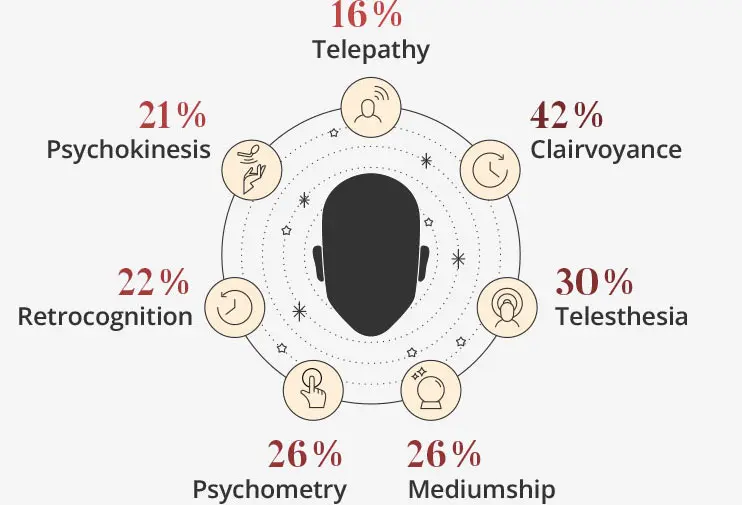
 Psychic Abilities
Psychic Abilities 

Clairvoyance
(Seeing, or otherwise becoming directly aware of, future events)

Telesthesia
(The perception of distant occurrences or objects by means other than the known senses)

Mediumship
(The ability to communicate with souls on the other side)

Psychometry
(The ability to discover facts about an event or person by touching inanimate objects associated with them)

Retrocognition
(Having knowledge of a past event which could not have been learned or inferred by normal means)

Psychokinesis
(The ability to move objects by mental effort alone)

Telepathy
(Seeing, or otherwise becoming directly aware of, future events)
Nearly half of those we surveyed (42%) claimed to possess the power of clairvoyance (seeing, or otherwise becoming directly aware of, future events before they occur). Another 30% claimed telesthesia (supernatural perception of distant occurrences or objects). More than one-quarter (26%) felt they were capable of either psychometry (the ability to discover facts about an event or person by touching objects associated with them) or mediumship. On average, those who claimed to have these powers became aware of their abilities around age 22.

Generational Sentiment Toward Psychic Abilities
While most Americans believe in psychic phenomena, their attitudes toward the supernatural have shifted over time. Which generations are the firmest believers, and which are the most skeptical?
Psychic Ability Self Assessment
By Generation
 Percentage Who Have Consulted a Psychic or Medium
Percentage Who Have Consulted a Psychic or Medium 
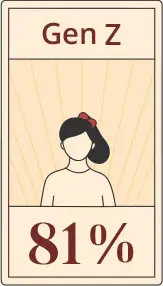
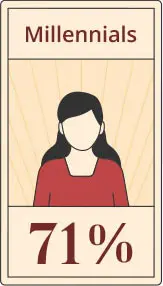
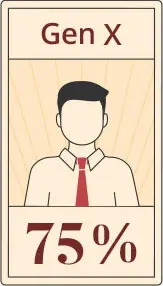


The belief in psychic phenomena seems to be increasing. While younger generations were the most open to the idea of supernatural forces, baby boomers were the most skeptical: only 61% had ever consulted a psychic or medium, and only 37% at most claimed any psychic abilities. In comparison, 80% of Gen Z said they possessed at least one. Gen Z also reported the strongest belief in psychic phenomena overall, with over 90% being believers and 81% having consulted a psychic or medium. More than half of them (54%) even claimed to have clairvoyance abilities.
 Which of the following psychic abilities do you possess?
Which of the following psychic abilities do you possess? 







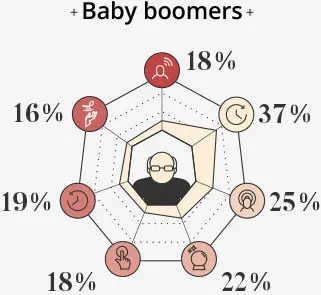
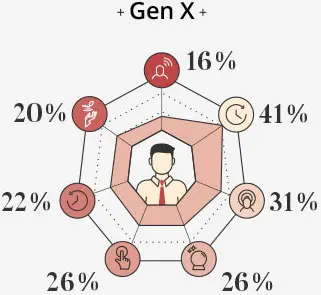
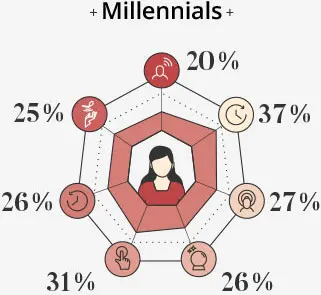
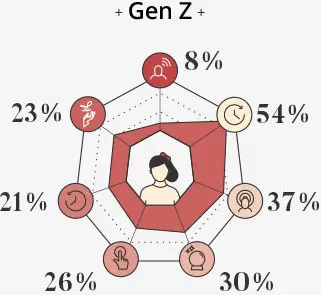
Belief in the supernatural among millennials and Gen Xers was slightly more neutral than that of our youngest and oldest respondents. However, many of them appeared to share some beliefs: 71% of millennials and 75% of Gen Xers had consulted a psychic or medium at some point. They also shared similar ideas about their own psychic abilities, reporting a difference of no more than 5% for each ability they claimed to possess.
Measuring Abilities
While many people think they have psychic abilities, it could be wishful thinking. That’s why we administered the Zener Test; we wanted to examine how our respondents’ self-perceptions of psychic ability correlated with their true abilities.
More Than A Feeling
Zener Test Assessment
 The Zener Test
The Zener Test 
+ Description +
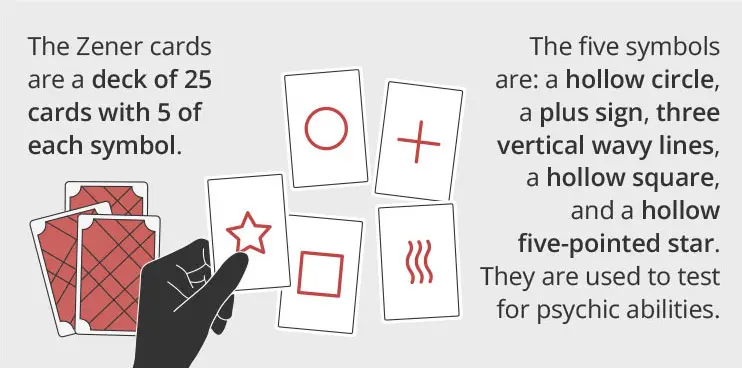
 The Zener Test
The Zener Test 
+ Description +
In a test for psychic abilities, the experimenter shuffles the cards, then picks out and privately observes a card. The test subject guesses which design is on the card, and the experimenter records the response. The experimenter repeats the process until the subject has guessed at all 25 cards.
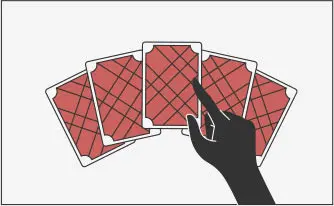
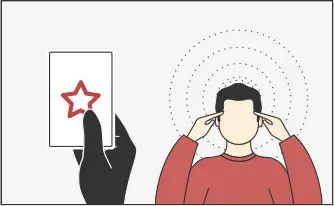
+ Statistics +
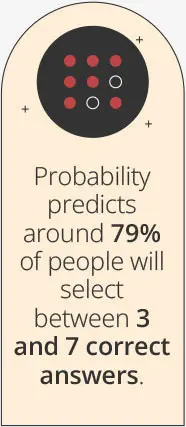
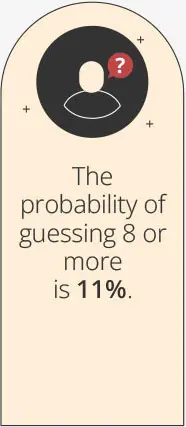
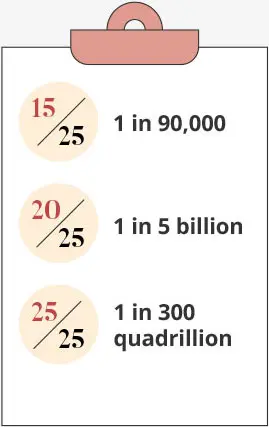

After examining the results of the Zener Test, we found a wide gap between self-perception and reality: Only 9% of our respondents scored high enough to be considered psychic. Self-belief does have power, however, as self-proclaimed psychics scored 22% higher than those who didn’t claim to have psychic abilities.
Zener Test Results
Percentage with Above-Average Scores*
 By Gender
By Gender 
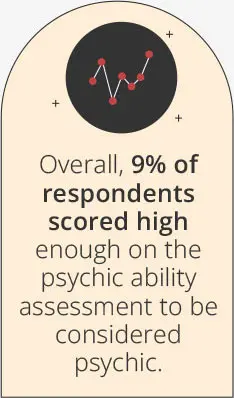
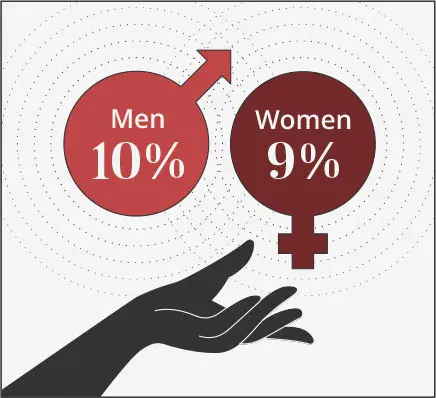
*8 cards (32%) or more guessed correctly
Men and women were nearly equally likely to possess powers, with 10% of men and 9% of women having psychic abilities. Generationally, millennials were the most likely to have psychic abilities (11%), and Gen Xers were the least likely (8%). Location may have slightly influenced respondents’ abilities as only 6% of people from the West had psychic abilities, while those in the Southwest and Midwest regions tied at 10% each.
 By Generation
By Generation 
 By Region
By Region 
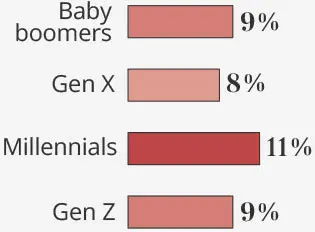
 By Region
By Region 
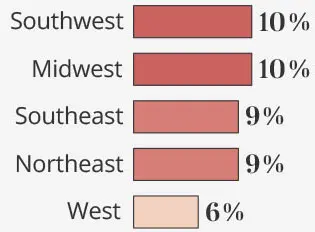

We also discovered that the astrological sign you’re born under doesn’t necessarily make you more or less likely to have supernatural abilities. Taurus (15%) and Libra (14%) seemed to be the sun signs most likely to have psychic abilities (15% and 14%, respectively). However, a 27-year-old female Leo scored the highest with a 48% on the Zener Test. Perhaps our respondent’s psychic ability – or lack thereof – was more influenced by their moon sign, which can be more closely related to one’s subconscious.
Men and women were nearly equally likely to possess powers, with 10% of men and 9% of women having psychic abilities. Generationally, millennials were the most likely to have psychic abilities (11%), and Gen Xers were the least likely (8%). Location may have slightly influenced respondents’ abilities as only 6% of people from the West had psychic abilities, while those in the Southwest and Midwest regions tied at 10% each.
 By Zodiac Sign
By Zodiac Sign 
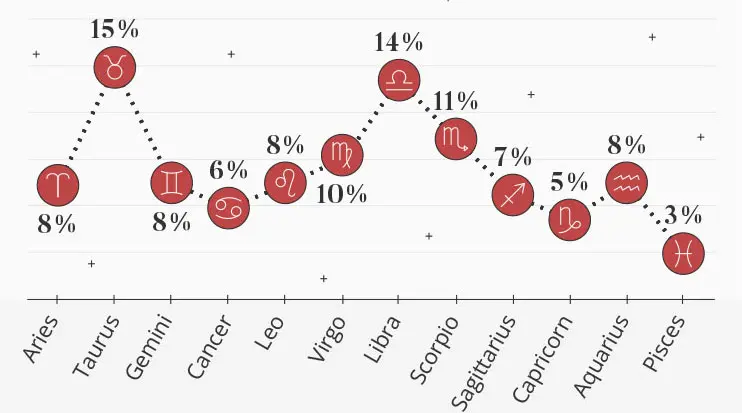
We know that many Americans believe in the supernatural. Among our respondents, 85% said they believe in psychic phenomena in particular. In fact, 72% reported having consulted a psychic or medium (someone who can communicate with souls on the other side) at least once. But we were surprised by how many claimed to have psychic abilities.
A World Beyond Ours
The belief in psychic phenomena has increased with each generation, along with the self-perception of psychic abilities. While, in actuality, natural psychic abilities are rare, the growing belief in supernatural powers may mean that more people will recognize their abilities and work to develop them. As more and more people embrace their gifts and share them, we can all live with more clarity and a greater connection to the world beyond.
Methodology
We surveyed 1,008 Americans regarding perceived psychic abilities. To measure their psychic potential, we administered the Zener Test to respondents. An above-average score (eight or more correct answers) is statistically significant and would suggest psychic ability.
The mean age of Americans was 40 years old. Among them, 55% were male, and 45% were female. The generations surveyed were Gen Z (26%), millennials (27%), Gen X (26%), and baby boomers (21%). To help ensure that all respondents took our survey seriously, they were required to identify and correctly answer an attention-check question.
About Psychic Source
Psychic Source is your most reliable source for psychic readings. We make it easy to access accurate and compassionate psychics via video, online, and phone readings.
Fair Use Statement
Do you know someone who believes they have psychic abilities? Feel free to share these findings for noncommercial purposes, but please provide a link back to this page.
